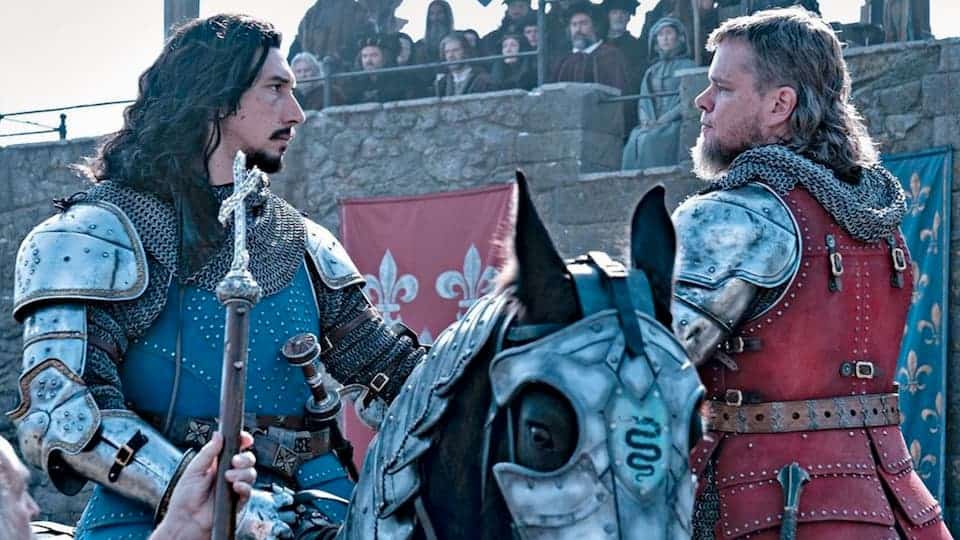Let's Stay Connected
Never miss a blog post or book news for Stella Atrium. Leave your email address here for notice of upcoming writer events.
Never miss a blog post or book news for Stella Atrium. Leave your email address here for notice of upcoming writer events.
Discover the early lives of your favorite characters in The Tribal War Series FREE ebook
SPECULATIVE FICTION WRITER
SPECULATIVE FICTION WRITER

Based on a novel by Eric Jager about a real event, the last judgment-by-combat in French history in 1386, and directed by Ridley Scott, THE LAST DUEL scintillates with combat and armor and great horses. Each blow of the duel is felt by viewers.

The Rashomon-style telling overcomplicates a straight-line plot. Illiterate and litigious Sir Jean de Carrouges (Matt Damon) has grudges against Squire Jacques le Gris (Adam Driver) but can gain no satisfaction from his drunken and degenerate liege lord Pierre d’Allecon (Ben Affleck) who claims that Carrouges is “no f—king fun.”
Players don’t even pretend at French accents, which is probably beyond Ben Affleck’s acting skills. Luckily, a female collaborator for the screenplay (Nicole Holofcener) provides some breathing space for Marguerite.
The usual male blind spots for directing are obvious. Marguerite de Carrouges (Jodie Comer) is the barren wife at the center of the lawsuit and excuse for a duel. Jodie Comer is 30 years younger than all the other players, and she looks like a foreign bride. What French woman has a thick braid of Nordic blonde hair?
**spoiler alert**
Le Gris spends one afternoon protesting to love Marguerite de Carrouges and forces himself on her while indulging some fantasy role in his mind. His giveaway is “if you run, I will only chase you,” a line he used in an earlier debauch.
Ladies, do these claims sound familiar?
Girl, when he starts talking like that, hang up the phone. Get off social media, locks the doors, gather the dogs, tell Alexa to record all sound in all rooms. Be certain the handgun in the bed stand is loaded.

Viewers of this movie are treated to two renditions of the rape, totally unneeded, and le Gris admonishes her to tell nobody, that her husband will most likely kill her. The threat demanding silence is all too familiar for any abused woman.
Marguerite lives an isolated life. A cruel mother-in-law who encourages the servants to report on her, fair-weather friends who give witness against her, farming peasants who have no opinion when she improves on her husband’s directives.

She must navigate the logic of men alone.
With the deck stacked against her, Marguerite stands her ground to use the logic of men to her favor. She allows her husband to broadcast the story of her humiliation. His goal even from the beginning is to force a duel with his rival le Gris, as ordered by the king, turning to his “trust in god.” At least de Carrouges plays to his strength, a proven warrior while le Gris is a educated courtier and accountant.
Le Gris admits to the adultery but not the rape, drawing fine lines of distinction. “She made the usual protests, but then she’s a lady of the court.” He seeks advice from his liege lord Pierre d’Alencon prompting a moment when Ben Affleck interjects some decidedly modern tropes, very Clinton-esque. “The common mind has no capacity for this nuance. Deny, deny, deny.” Le Gris holds onto this advise until the moment a knife is thrust through his throat.
So Marguerite finally has her audience with the king before his court. The prosecutor uses the best of male logic. “Le Gris denies the incident, but if we entertain for the moment that you didn’t dream the story, then the incident (that he denies happened) cannot be rape because you enjoyed it as evidenced by your pregnancy.”
Men will say anything. And other men will nod like that makes sense.
So they go forward with the duel after she bears the child. King Charles IV provides spectacle for the masses and appears to accede to god’s judgment.
If le Gris wins the combat, then the woman he professes to love, whose child may be his, will be burned at the stake. But his “honor” counts for more.

De Carrouges does win the combat, so his name is cleared and his wife and child live, not that he cares about the heir. The knight is eager to bask in the triumph, though, even raising the bloody knife while they ride out of the arena.

Marguerite rides behind. The crowd is not cheering for her. She has no avenue of redress, like Sec. of Labor Raymond Donovan under Pres. Reagan who was unjustly attacked by the press and famously asked, “Where do I go to get my reputation back?”
Marguerite de Carrouges wins by enduring. She inherits the estate and tracts of farmland when her husband later falls in the crusades, another useless and destructive expression of the logic of men.